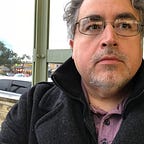Unsafe at Any Speed
Edward Curtin’s Seeking Truth in a Country of Lies
Susan Sontag once remarked that intelligence could be best understood as a “taste in ideas.” A throwaway quote, perhaps, but a pertinent one — although we might say a taste for ideas, since in our own time it is less about hierarchical arrangement and more about having any conscious thoughts whatsoever. It therefore struck me as surprising the other day when I clicked upon a twitter link for Edward Curtin’s article “The End of Reality?” on the Global Research website. I was greeted with a “warning” from twitter that THIS LINK MAY BE UNSAFE.
Unsafe? I pressed on; for what good what an internet be if it were entirely safe?
Now if you read Curtin’s article (which I wholly recommend) you will find a meditation on propaganda in the modern world expressed in philosophical terms, with references ranging from Ursula K. LeGuin to Nietzsche to Bartleby the Scrivener. Curtin’s poetical style and clear-eyed thinking are apparent and unlikely to be mistaken for either Sean Hannity or Rachel Maddow. The article serves as an excellent advertisement for his new book, Seeking Truth in a Country of Lies, which is a collection of disparate essays on political, literary, and cultural topics. Are the topics controversial? Of course. (What would be the point of writing essays reinforcing all our standard assumptions? Asserting the sky is blue is not grist for discussion. Now when the sky turns fiery orange, as it has in the Western United States of late, now you’ve got something.)
In the book you will find an interview with whistleblower ex-cop Frank Serpico, along with thoughts about the Kennedy assassination, about NBA player Kevin Love, about Winston Smith, about Terence Malick films and about the transitory nature of this ephemeral life we lead online. Curtin observes: “Despite our advanced technology today, we still die, but we live faster, which is not to say better. We live faster until modern medicine makes our dying slower…Awash in cultural nostalgia that gives us a frisson of false comfort, we scroll the past as fast as we can.” True that.
If there is a unifying theme — beyond the pleasure of reading someone who thinks, and has an excellent taste in and for ideas, it is to recognize the ways in which our lives are pushing us in one direction or another and to pause and recognize that. Just because the stream is headed in one direction doesn’t mean that it’s the only way to proceed. It may lead to the falls.
Worse yet, some of these distinctions are extremely subtle. What is the difference between a mainstream historian like Stephen Kinzer and a journalist like David Talbot? What are the ideological boundaries of Chris Hedges? Who are the thinkers and writers who can help identify these distinctions? Curtin points the way to names like Ellul and Postman, among many others.
So is this unsafe? I don’t think so. (When I see the words, THIS LINK MAY BE UNSAFE, I can’t help but flash back to the last words of American Psycho: THIS IS NOT AN EXIT.) Curtin’s exceptionally thoughtful and measured writing isn’t a threat to anyone except those who prefer not to think.
